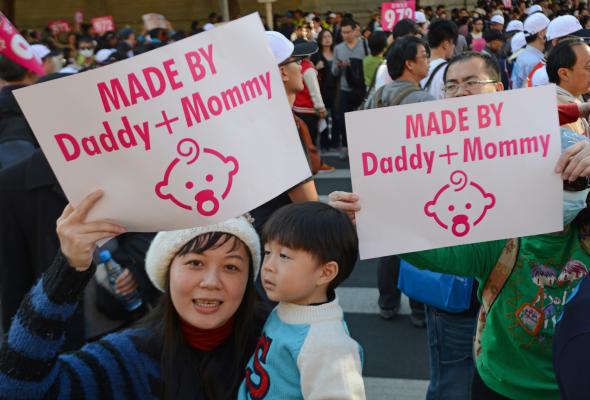Is gay marriage just like interracial marriage? If you’re against gay marriage, is that the same as racism?
Hundreds of Slate readers have made that argument in comments posted over the last few days. They’ve raised the analogy in the context of a New Mexico couple who refused to photograph a same-sex commitment ceremony. That’s a complex case. But the race analogy is worth addressing on its own.
In many ways, today’s debate about same-sex marriage resembles earlier debates about interracial marriage. I’ve drawn this analogy myself. In at least two ways, however, the situations differ. From the discriminator’s standpoint, opposing same-sex marriage is more defensible. At the same time, from the target’s standpoint, it’s more oppressive.
The central, categorical objection to gay marriage is that same-sex couples can’t produce biological children together. Sherif Girgis, Robert George, and Ryan Anderson emphasize this distinction in their recent essay and book, What Is Marriage? My colleague Mark Stern challenged their case in Slate last year, and I agree with his critique. The procreation argument focuses too much on sex and too little on love and commitment.
Just because I don’t agree with an argument, however, doesn’t mean it’s irrational. Marriage has historically been a sexual institution. A rational person can maintain that a relationship between two people categorically incapable of producing children together—that is, two people of the same sex—can’t be a marriage. That argument doesn’t justify denying them the right to love one another openly, nor does it justify denying them the benefits and honors we bestow on couples for making lifetime commitments. But it can justify a person’s refusal to accept a same-sex relationship as a marriage.
The argument has plenty of problems. We let old people marry. We let infertile people marry. We don’t insist that married couples produce kids. We welcome adoption and stepfamilies. Gay couples can have kids using donated eggs or sperm. Many gay people are already raising children, and doing it just as well as straight people.
All of that is true. But I’d be remiss to omit the rejoinder from George and his colleagues: Sex is a much brighter line than fertility or intention to bear children. It’s certainly a less intrusive distinction to enforce.
Many people think that this distinction is important enough to withhold the word “marriage” from same-sex couples; I think those people are being unjust and obtuse to the moral reality of homosexual love. But I can’t dismiss them as irrational.
I can, however, dismiss as irrational any objection to interracial marriage. Stern points to Ian Millhiser’s useful summary of religious arguments that were once made against interracial marriage. They include:
“Almighty God created the races white, black, yellow, malay and red, and he placed them on separate continents. And but for the interference with his arrangement there would be no cause for such marriages. The fact that he separated the races shows that he did not intend for the races to mix.”
“Purity of race is a gift of God.”
“[T]he good Lord was the original segregationist.”
“God made racial differences as He made sexual differences.”
These statements are objectively false. Every scientific review of human history has found that racial distinctions are not categorical and continue to change. People of different races produce kids together all the time. There’s no biological basis for refusing to accept an interracial relationship as a marriage.
That’s why, from the discriminator’s standpoint, it’s more defensible to oppose gay marriage than to oppose interracial marriage. But why confine ourselves to that standpoint? Why not consider the perspective of the person targeted by the discrimination?
From the perspective of a would-be spouse, being denied the right to same-sex marriage can be, in some ways, worse. If you’re attracted to someone of another race, and the law won’t let you marry anyone of that race, you can find someone of your own race to marry. You shouldn’t have to do that, but you can. But if you’re exclusively attracted to people of your own sex, and the law forbids you to marry such a person, then everything conservatives praise about marriage—the sharing, the happiness, the fulfillment, the solemnity, the respect—is denied to you.
Many useful comparisons can be drawn between between same-sex marriage and interracial marriage. But let’s not pretend they’re exactly the same. For better and for worse, they aren’t.
